Writing Based on an Improvisiation
Peter has been involved in teaching drama and improvisation for nearly 40 years. He has taught drama, improvisation and English in schools and business people. He uses his experience as a professional actor and director to run drama and improvisation classes for teachers and actors. His work with the Pilgrims Teacher Training over the last 25 years has seen him run workshops in drama, improvisation, body language, Shakespeare, activities for primary and secondary students, work on voice and status for teachers all over the world. Currently, Peter is finishing his book on using improvisation and drama techniques for the language classroom and coaching. He also writes articles for various English teacher magazines. Email: petergdyer@hotmail.com
Getting started
I introduce to the students the idea of improvisation first: We are going to have a dialogue based on simple ideas. We must remember to follow the rules to the activity, listen to each other’s offers and maintain a logical flow of conversation.
Activity 1: Dialogue using the alphabet.
The rule for this activity is quite simple but as you will soon appreciate, it is challenging, particularly so when we begin with a speaking exercise.
I begin firstly with a brief demonstration using another student with whom I have primed up before the class.
This activity simply uses the alphabet to create dialogue for speaking and later for creative writing.
Sample text 1.
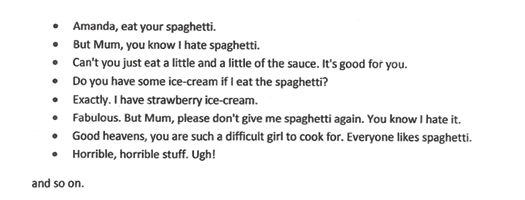
The students continue as long as they can, they are not expected to finish the alphabet. When they feel they have finished, they can perhaps try to write in pairs what occured in the speaking activity or they might start to write a completely fresh dialogue, perhaps with a new partner.
Activity 2: Dialogue using the last letter for the first word improvisation.
The instruction is that we have a conversation but it is based on what I call, "last letter, first word". In this dialogue, one person, the speaker, whom we’ll call No. 1. begins to speak. The partner, No. 2, listens carefully to the content but also makes note of the last letter of the last word the first speaker has used. Partner 2. responds to speaker No.1. beginning with a word starting with the last letter speaker No.1. used. Speaker No. 1. follows using the last letter speaker No. 2. used. Of course, we must follow content so that the offers are just not sentences but an ongoing conversation.
Obviously, the dialogue is not fluent as the students work on the last letter, first word but it is most entertaining. In many circumstances, exclamations or encouragers are used e.g. Uhmm, Hmm, Yeah, No, Ah, Er etc. There are ofcourse many words in English ending in "e" and I tell students not to worry if they use a word in response more than once. If a player is left with the letter "K", this can be challenging but not impossible.
I remember once, I set up students in pairs and asked them to imagine they were sharing a drink or meal with an old friend in a restaurant. It helps students to be given a character and place to lead them into the improvisation. One student was given the word, "work". He thought for a while and then turned to an imaginary waiter in the restaurant and said, "Karl, we'll have the menu now please". Wow! In another example set in a restaurant, one student was given a "K" and after a moment, looked sharply to his right and said, "Kangaroo. Who brought that Kangaroo in the restaurant?" Just remarkable. Anything is possible and when students realise this, they are free to use their imaginations. These young people were advanced students about 16 years of age.
Sample text 2 This dialogue was written based on a chance meeting of colleagues.
Joan: Hi Jim. How are you? I haven’t seen you for ages.
Jim: Some months in fact Joan. Have you been away?
Joan: Yes, I took a long holiday in Australia.
Jim: Ah! That must have been wonderful. What did you do?
Joan: Oh! We did so much and we learnt how to surf and scuba dive.
Jim: Exciting. Oooo! Did you see any sharks?
Joan: Some people we were swimming with saw a shark and we got out of the water very
fast. No body was attacked.
Jim: Dangerous things sharks. They have lots of dangerous animals in Australia but I
would love to go to their beaches and learn to surf.
Joan: Fear often stops us from doing things.
Jim: So true. What are your plans now?
Joan: Well. I’m going back to my job next week to start again.
Jim: Now Joan. I must tell you something. I have replaced you in your position.
Joan: Noooooo.Why?
Jim: You have been going away so often and for so long, they have decided to replace you
with someone more reliable.
Free speaking
Once students get the idea of the activity, I set them up in pairs and give them a character each and a place in which to begin their impro. They love it despite the slowed pace in dialogue. Interestingly, when a partener pauses for a while to think of a word and then produces a new line, there is immediate laughter as that person’s offer is seen as very clever. Ideas for character situations might be a dentist and patient in a surgery, a second hand car dealer and customer, a police officer and a traffic offender etc. For a three person dialogue, I once set up three students in a funny scene. Two were people inspecting a flat for possible purchase. The other student was the real estate agent showing them around. It is great to give students space in which to move about in their scenes.
Free writing
Activity 1
Once we have done these, and ofcourse I am there to help when asked to, I hand individuals or pairs a photo or picture of two people and ask them to write another dialogue. Lets look at this Hopper painting of a couple in a room. Pictures can be chosen for appropriate age groups. To encourage our students, the teacher needs to ask a few questions to immerse them into the picture. Questions suitable for this picture might be for example,
What do you see?
Where are these people?
What does the room look like?
What is outside the room?
What is their relationship?
What are they doing?
What is the man thinking?
What is the woman thinking?
What does she want?
What does he want?
Below, you can find something based on these questions. The dialogue, of course, is more suitable for adults.
Sample text 1
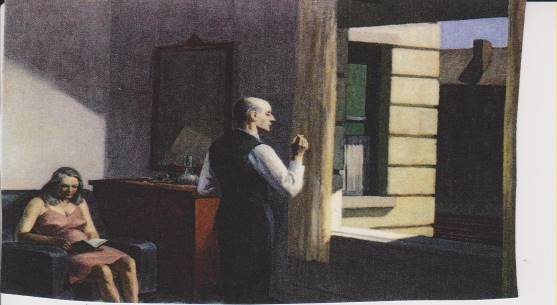
Simon: It’s so boring here and so hot.
Maggie: Too bad you just can’t sit down and read a little. Do you know how many of those
horrible cigarettes you’ve smoked this afternoon?
Simon: No. And I don’t care.
Maggie: Every weekend you’re the same. Why don’t you go to the club?
Simon: Boring. The same people, the same stories, the same jokes. I want a change.
Maggie: Ever tried reading?
Simon: Good gracious no, I couldn’t read that romantic stuff you read.
Maggie: Don’t be silly Simon. I am not asking you to read my books. Look, why don’t you go to the
library and read something you like. The library is airconditioned and you can use my
library card.
Simon: Dear Maggie, I guess that’s a good idea and at least I can stop this smoking.
Maggie: Great Simon. Here’s my card.
Activity 2 Monologue writing based on the last letter, first word.
Next, it is time for writing a monologue based on a photo of an interesting person. This is often set for homework and what amazes me is that the students often return to the next class saying how exciting the activity was and how they just couldn't stop writing. I have done this with them suggesting a famous person from history or a movie star as an alternative prompt or even a picture of a building. One student wrote a stunning monologue giving the voice to a picture of a light house. Remember, if we are using a picture, encourage your students to ask questions first before they begin writing. See examples of questions in the previous exercise.
Activity 3
I am again sharing more adult monologues to suit these Hopper pictures below.
LADY WAITING IN THE MOTEL LOBBY - MONOLOGUE
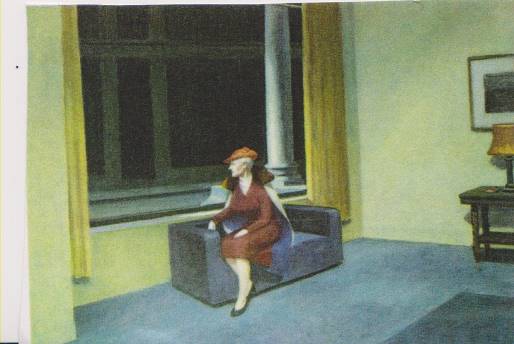
Oh! I just don’t know. What am I doing here? Each time someone walks in the lobby, I think it’s James coming to take us back to San Francisco. Oh! I don’t know if I’ve done the right thing. “Going out for cigarettes”, he said, and here I am waiting and waiting. Guess I was blown away by James and the idea of a perfect romance to lift me out of my dreary life with Simon.
No one knows where I am. Managed to sneak away with James while Simon was on one of his many business trips. Silly thing is, I should feel guilty, yet I don’t. Too disillusioned with my marriage to Simon to feel at all guilty. Yes, I want excitement and happiness but is James the answer? Really, I’m beginning to think it is just me going crazy and only me. Each heart directed decision I make seems to leave me wondering, “Well, so what?”
Time to go back I guess….. but wait, James has walked in again smiling warmly at me and his usual charming self. For God’s sake, help me to be more enthused otherwise I’ll end up with nothing and no-one.
THE MAN SITTING OUTSIDE HIS SHOP - MONOLOGUE.
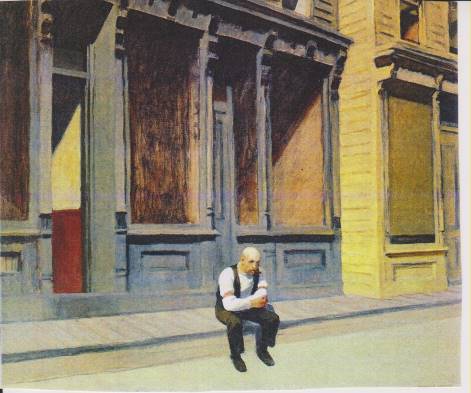
Well, it’s come to this. Sitting outside my shop wondering what I can do now. Why did the big supermarkets have to come and destroy my business? Six decades, my family has run this shop serving people in this small community. Yes, I remember the day my dear old Dad opened his new shop. Parton’s hardware shop with everything you need. Dad died after working hard for thirty years. Sixteen I was when I began to work for him and I took over the business after his death. Hardware is all I sold but I had a thriving business in this little town and I felt I was a big part of it. Then after all these years of hard work, the supermarkets moved in and offered hardware at cheaper prices. Soon people started deserting my shop and I tried not to notice but it was all too clear that I was the loser. Reality finally really hit me when the banks refused to give me more money to stay open. Not that I can really blame them. Mary tried to keep me going but last Monday, even she knew it was hopeless. So, today I closed the shop, drew down the blinds and removed all the signs and I’m just sitting here thinking over the years before I go home to Mary.
INTERMISSION / A SOLO CHARACTER - MONOLOGUE
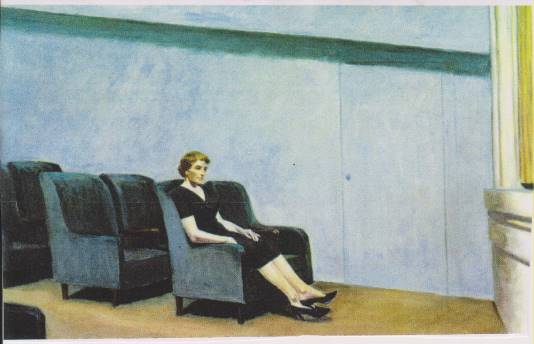
Well, another film, another cinema. Always alone and no one to share the moment with. Horrible if I think about it but at least I can go to the cinema by myself without fear. Reality is that I doubt I will ever have a partner in my life. Every film of director Jules Roman I’ve seen but it means nothing really when you can’t share it with someone in your life. Eric came with me all the time and we discussed films endlessly. Years ago that is. Sometimes it’s hard to believe he’s been gone for over 10 years.
So, some couples are coming into the cinema. Awful when they talk all the way through the film. Manners, no one seems to have any manners these days. Sometimes I tell them to be quiet but they look at me as though they hate me. Eventually when the film finishes and they get up to leave, they look at me with utter contempt. This simply because I dared to ask them to be quiet.
The movie’s starting God, I hope they shut up.
Please check the Improvisation Techniques for the English Classroom course at Pilgrims website.
Please check the Acting Skills for the English Classroom course at Pilgrims website.
Please check the Eanhncing Language Learning through Creativity course at Pilgrims website
The Play as a Living, Breathing, Ever-evolving Entity
Hanaa Mansour, Palestine;Nick Bilbrough, UKWriting Based on an Improvisiation
Peter Dyer, France